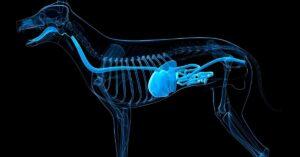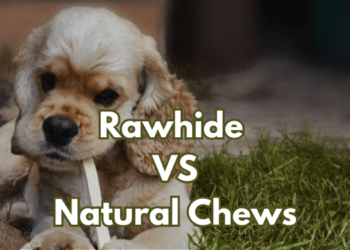Spaniels are known to be food hoggers. And while it may initially seem an adorable act, you will soon start noticing excessive weight gain symptoms that could easily lead to obesity. Therefore, Spaniel parents are often advised to maintain a strict feeding regime and schedule by most vets and pet experts. But for that understanding how their digestive system works is the first step.
Depending upon the food, the Spaniel digestive system may take anywhere between 4-12 hours for the complete digestion of a meal. Generally dry food takes the most time for digestion, whereas wet canned food and gravies make their way into the intestinal tract much faster. This is also variable based upon the pooch’s health and age as a sick pup may not be able to process food much efficiently or faster as a healthy one.
Now that we know how long it takes for these pups to digest their food, let’s have a brief discussion about how the canine digestive system works.
Table of Contents
How does the Spaniel digestive system work?
Similar to all canines, the Spaniel digestive system is categorized into:
Mouth
The journey into the canine digestive system starts with the mouth. Spaniels have 42 teeth which work together to tear the food into small pieces for easy passing through the esophagus which comes next in the process. The salivary glands present in the mouth produce saliva which softens the chewed food and even aids to break down some of its components.
Stomach
Next comes the food reservoir also known as the stomach, tummy, or belly. The swallowed food upon reaching the stomach gets mixed with acids which are necessary for the further breakdown of the food items. Unlike humans, dogs’ belly absorbs around 70 percent of the food with only the remaining 30 percent going down to the intestinal tract. Therefore, naturally the time required for complete digestion in canines is higher than those of their human companions.
Intestines
Upon reaching the small intestine, the remaining portion of the undigested food again meets bile and pancreatic juice that are responsible for the absorption of any remaining nutrients. To smoothen the process the walls of the intestinal walls are lined by layers of thick mucus sheets. From there the nutrients are passed to the liver for conversion into energy, while the now nutritionless food is passed down into the large intestine.
The final part of the intestine directly leads to rectal muscles that finally connect it to the anus. The waste product stays stored there until the brain sends the signal for contraction of the anal pathway, leading to defecation.
What factors may cause variations in the time required for a Spaniel to digest food?
Apart from the food type, here are some other factors that could cause variations in the time required for your Spaniel to digest their food.
Food quality and quantity
Spaniels are known for their love of food. But feeding them too much or not getting them good quality food can be a leading factor in digestion-related issues. This is because while not keeping a track of how much your woofer eats can make them obese, the latter may not be enough for their daily nutrients requirement, thereby making them seem malnourished, have nutrition deficiency, and even deteriorate their coat and fur shine in the long run.
Ingredients and composition levels
The next factor which puts a tremendous impact on their digestive capabilities include the ingredients and composition levels of their feeding. For instance, if your dog feed contains more carbohydrate or calorie contents, then the digestion is bound to be much delayed than other feed types.
Age and size
Generally younger puppies have a greater appetite than older ones, and hence they tend to eat more which could cause delayed digestion. The same also goes for their digestive system as Spaniels from 1-7 years have more robust and efficiently working organs, thereby leading to more secretion of all necessary digestive juices. However, with age this may deteriorate as metabolism grows weaker and slower steadily.
Access to fresh water
Hydration is very essential for digestion. And therefore if the pooch has access to a fresh bowl of water every time, then also the time required for complete absorption of the food will be much less. Just like humans, dogs also have a hard time digesting dry food as it often impacts the production of digestive juices in the stomach.
Environmental factors
A drastic change in the prevalent climatic condition is also bound to affect your pooch’s appetite and their rate of absorption. Typically in higher temperatures or humid environments, canine bodies produce lesser stomach acids, thereby delaying the whole process and offering an uncomfortable bloated feeling. This is also why vets and pet nutritionists often advise Spaniel owners to increase the water intake for their fur babies in hot climates.
Medical history and existing health conditions
Like we discussed earlier, canine digestion requires the proper synchronization of various organs. Therefore, even a slight deviation in their working could result in huge changes in the food absorption rate, like in case of sick pups or ones with prevailing medical history of digestive issues. As their body is already going through tremendous pressure for recovery, their brain is unable to perform efficiently and hence the delay. Certain medications may also weaken their digestive system causing issues in the overall process.
Pedigree
If your pup’s parents have had a history of digestive issues, then also the Spaniel may have a delayed absorption rate than other pups. However, unfortunately there is no possible method to detect this possibility until and unless the canine reaches a certain age.
Feeding personality
Finally, a lot also depends upon the way your Spaniel ingests its food on a daily basis. For instance, if your pupper practically munches down every last bit of the food in less than a minute, then they are bound to have a very slow digestive rate, and vice versa. This is because as the food passes into the stomach without being broken down into finer particles, the stomach acids are required to complete the left out task and then proceed ahead with their normal functioning. This in turn slows down the final result.
How to increase my Spaniel’s digestion capabilities?
If lately you have been witnessing your Spaniel have digestive issues, suffer from appetite loss or any other signs of slow digestion, the first thing to do is to ensure that they are professionally and thoroughly checked by a veterinarian. No matter how minute these symptoms may seem, it may be occuring due to an underlying condition. So when diagnosed at the right time it would take much less effort and time to be treated, meaning much less pain and discomfort to your Spaniel at the later stage.
Similarly, prepping easy-to-digest vet recommended homemade meals consisting of chicken, turkey, fish, eggs, yogurt, cheese is also going to help your pooch digest much better. You can also add in high-quality vitamin and mineral supplements for your dog’s digestion and overall health along with their food on a daily basis. But make sure to have a talk with your vet or pet nutritionist first before investing in any supplements brands, and meanwhile don’t forget to get a feeding regime for your pooch.
It doesn’t take much to care for your Spaniel’s digestion, but proper understanding, time and patience. So, stake up your efforts today and get ready to help your adorable fur baby have a healthy, happy, and a long life by your side.
Subscribe to our mailing list and get all recent releases right in your mail address.
If you are a dog lover then, Subscribe to our weekly newsletters. No Spams!









